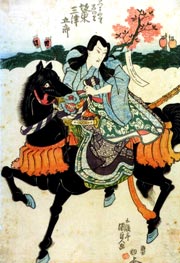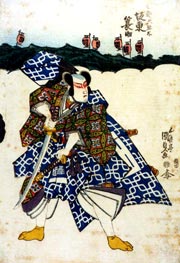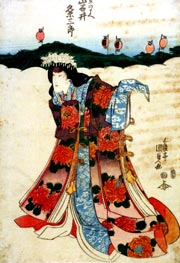| UBARA NO SATO |
| Play title | Ichi-no-Tani Futaba Gunki |
| Authors | Namiki S˘suke Asada Icch˘ Namioka Geiji Namiki Sh˘z˘ I Naniwa Sanz˘ Toyotake Jinroku |
| History |
The play "Ichi-no-Tani Futaba Gunki" (five acts) was originally written for the puppet theater and staged for the first time in ďsaka at the Toyotakeza in the 12th lunar month of 1751. It was adapted for Kabuki the following year and staged for the first time in Edo at the Moritaza in the 4th lunar month of 1752 [casting]. It was also performed for the first time in ďsaka in the 11th lunar month of 1752 at the Naka no Shibai as a kaomise drama [casting]. "Ubara no Sato", which is also commonly called "Nagashi no Eda" ("Letting flow the branch" ?), was staged for the last time in June 1975 at the Shinbashi Enbuj˘, starring Kataoka Takao, Sawamura Kiyoshir˘, Ichikawa Ebiz˘ X and Ichikawa Fukunosuke III in the roles of Taira no Tadanori, Kiku-no-Mae, Okabe Rokuyata and Hayashi. |
| Structure |
The "Ubara no Sato" scene ("the village of Ubara"), which is rarely staged, is the final scene of the second act of "Ichi-no-Tani Futaba Gunki". |
| Key words |
Genpei Kassen Genpei-kassenmono Gidayű Ky˘gen Giri/Ninj˘ Ichi-no-Tani Ichi-no-Tani no Tatakai Jidaimono Kajiwara Kagetaka Kubi Jikken Okabe Rokuyata Okabe Tadasumi Taira Tadanori |
| Summary |
In the village of Ubara, in the province of Settsu, lived an old woman named Hayashi. She was formerly the wife of a certain Taira samurai. After her husband had run away, and his whereabouts become unknown, she entered the service of the poet Shunzei, and became nurse to his daughter Kiku-no-Mae. When her charge grew to be a young woman, Hayashi left her position and retired to her village. There she was now leading a lonely life. One evening, a belated traveller knocked at her door and asked her to give him shelter for the night. She granted his request, and both were pleasantly surprised to find that they were old friends. He proved to be none other than Taira no Tadanori on his way back to Ichi-no-Tani from calling on his master Lord Shunzei. Hayashi welcomed him heartily, and they chatted about what had happened to them since they had last met. "Well," she said with sighs, "I have heard of your relations with Lady Kiku-no-Mae. If it had not been for the war between the Tairas and the Minamotos, your marriage would have already taken place. My hearty sympathy is with you!". Shortly afterwards, Tadanori retired into an inner room to rest for the night. When the hours were advanced, a violent storm broke out, in the midst of which was heard a hard knocking at the gate. Hayashi awoke. "Who is there?" she cried. "It is I Kiku-no-Mae, my nurse. Excuse my disturbing your sleep." When she heard the answer, the old woman leaped down to the courtyard, and opened the door. "I am glad to see you," she said in tones of wonder. "How is it that you have come here alone through the storm at midnight?". The girl wept. "Well," she said, "I have walked so far in pursuit of Lord Tadanori. Alas! I have been unable to overtake him. I don't know this neighbourhood well, so I have been wandering here and there in the darkness. It became late, and I had lost my way. However, with great difficulty I at last found my way to your house. Now I cannot hope to overtake Lord Tadanori. What shall I do?". "Be of good cheer, my lady. Lord Tadanori came here some while ago, and is still within." "Is that true? I am very glad! Please let me see him quickly." "Lord Tadanori is resting in the inner room. You can go and see him yourself." Kiku-no-Mae went joyfully into the room. Shortly afterwards a noise was heard within, and Kiku-no-Mae rushed out in tears. Hayashi was wonder-struck, and asked the reason. The girl explained that Tadanori had unkindly proposed that she should give him up, and return to her father's house. This filled her with sorrow and anger. The old woman vainly tried to soothe her. She wept unceasingly, and complained that her lover was cold-hearted. At that moment Tadanori came in. "I fear that I seem unkind" he said, "but I assure you that it is entirely for your sake, and for your father's, dear Kiku-no-Mae. The Tairas are sure to be defeated in the coming battle, and I shall die in the fray. I am, therefore, convinced that you had better give me up, and return to your home as soon as possible. I owe your father a very great deal, so if I take you with me, I am sure he will be suspected of taking sides with the Tairas, and then who can tell what punishment may befall him. I can't bear the thought of my benefactor suffering on my account. Weigh these reasons well, and return home for your father's, your own, and my sake. Frankly, I do not like to part from you, but there is no help for it. Please control your emotion, and listen to reason. I urge you to follow my advice." "Oh, no!" she sobbed, clutching his sleeve, "how can I part from you when you are going to fight to the death? I will accompany you wherever you go. I swear I will never give you up. Permit me to share your lot in life or in death, my dear Lord Tadanori." Tadanori was at a loss to know how to deal with Kiku-no-Mae, and Hayashi was equally puzzled how to comfort her. At this moment the sound of war-cries was wafted in by the wind. A little later the sound was followed by the random beating of bells and drums. A party of soldiers appeared on the scene and their captain rushed up to the gate. "Open!" he cried aloud. "I, Kajiwara Kagetaka, have had secret information that Taira no Tadanori is hiding in this house, and have come to take him prisoner. My troops have completely surrounded the dwelling, and there is no means of escape. I order him, therefore, to come out and become my prisoner peacefully." Tadanori was not at all frightened. He bade Kiku-no-Mae and Hayashi keep within, and unsheathed his great sword. "Pooh, Kagetaka!" he sneered, "your meanness and cowardice are past belief ! Why did you not proceed to the battlefield instead of surrounding me with so many troops when I am alone? I am not such a weakling as to allow myself to be easily caught by you! Approach, and I will show you in what direction my abilities lie!" So crying, the hero threw himself among the foes and fought desperately, now cutting and kicking, and then trampling on them. The latter were seized with fear, and retreated one after another. Kagetaka was also, in spite of his threatening attitude, seized with fear, and took to his heels. Tadanori paused to take breath, and soon afterwards the sound of bells and drums and war cries was again heard. "Confound it!" he said to himself, sighing deeply. "Kagetaka must be coming again with a large army. If I were on the battle-field, I should not fear even thousands of foes, but how can I defend myself against such a large force when I am in so small a house? Alas! on the one hand I am not certain whether I shall ever realize my dearest wish concerning my poem; on the other, it seems that I am to die an inglorious death at the hands of a craven fellow! It is a pity beyond expression!". Presently a warrior of commanding appearance came in sight. He was not in armour, as had been expected, but in full dress. This consisted of a su˘, a daimon, and a nagabakama. He was none other than Okabe Rokuyata, an officer of General Yoshitsune. He saluted Tadanori politely, and with much grace. "I am delighted to see you, Lord Tadanori," he began. "As the coming battle is to be fought in order to decide the destiny of the Tairas and the Minamotos, we ought to fight openly on the battle-field. General Yoshitsune is, therefore, extremely sorry to hear of Kajiwara Kagetaka's mean deed in privately attacking you when you were in your defenseless condition. But now, as to my message. General Yoshitsune admired your poem, selected by Lord Shunzei, very much. In accordance with your desire, he has ordered it to be included in the Senzaishű. But unfortunately you are branded as a 'rebel.' It is therefore considered improper that you should give your name, so your poem is inserted as 'anonymous.'" With these words he offered Tadanori the tanzaku tied to a branch of cherry-blossoms. "Here is a proof of the fact. General Yoshitsune begs to present this to you, sir." When Tadanori heard the news, his joy knew no bounds. He received the tanzaku with great reverence. "I accept this gift," he said, "from General Yoshitsune, and am deeply grateful." "To speak frankly," continued Tadanori, "I feared that my poem would probably be rejected from motives of hostility. It has been accepted, however, through the sympathy and magnanimity of General Yoshitsune. This is the greatest honour that could possibly be given me. My great wish is attained, so I have nothing else to desire in this life. Taking into consideration that my days are numbered, I prefer being taken captive by you, an illustrious hero, to dying a disgraceful death at the hands of unknown soldiers". He put his hands behind his back: "You are at liberty to bind me, sir." "No, no," answered Rokuyata laughing, "I haven't come to arrest you. Shall we not fight each other on the battle-field? Do you think I am as mean a coward as Kagetaka?" "Excuse my thoughtless words. Your generosity and that of General Yoshitsune overwhelm me indeed. You are both noble samurai" At this moment, the crowing of cocks proclaimed the dawn. Rokuyata rose to his feet. "It will soon be morning," he said. "If you walk alone towards Ichi-no-Tani, you may encounter further trouble. I shall conduct you to the camp. Please be in readiness." Rokuyata gave orders to his soldiers, who brought before Tadanori a beautifully caparisoned steed, which had been brought for the purpose. Tadanori thanked him warmly, and without a moment's hesitation seized the horse's mane, and sprang upon its back. Kiku-no-Mae, who had been listening to all this, thought that this was the last moment she would ever see her lover. She ran out. "Wait one moment, Lord Tadanori," she cried. Hayashi stood in front of her, and tried to conceal her. Rokuyata instantly perceived the truth. He cut off the right sleeve of Tadanori's robe, and handed it to the old woman. "I beg," said he, "to offer you this in acknowledgment of your having kindly lodged Lord Tadanori. If you find it of no use to yourself, please give it to anybody else who may desire it, madame." This was intended as a hint that the sleeve was for Kiku-no-Mae, as a memento of her lover. The passionate girl almost burst into tears of gratitude. Tadanori carrying the branch of cherry-blossoms on his back, set out on his journey guarded by Rokuyata and his troops; but his heart remained with his sweetheart. Miyamori Asatar˘ in "Old Japanese Dramas" |
| Trivia |
The young star Ichikawa Danjűr˘ VIII popularized a kimono pattern (a lattice pattern) when he played the role of Okabe Rokuyata. This pattern is still used nowadays on yukata for men [some visuals on a Japanese web page]. This pattern is called rokuyata-g˘shi (literally Rokuyata's lattice). |
 |
 |
 |
|
The actors Band˘ Mitsugor˘ III, Band˘ Minosuke II and Iwai Kumesabur˘ II playing the roles of Taira no Tadanori, Okabe Rokuyata and Kiku-no-Mae in the epic drama "Ichi-no-Tani Futaba Gunki", which was staged in the 9th lunar month of 1820 at the Nakamuraza (print made by Utagawa Kunisada I) |
||
|
|
| Contact | Main | Top | Updates | Actors | Plays | Playwrights | Programs | Links | FAQ | Glossary | Chronology | Illustrations | Prints | Characters | Derivatives | Theaters | Coming soon | News |